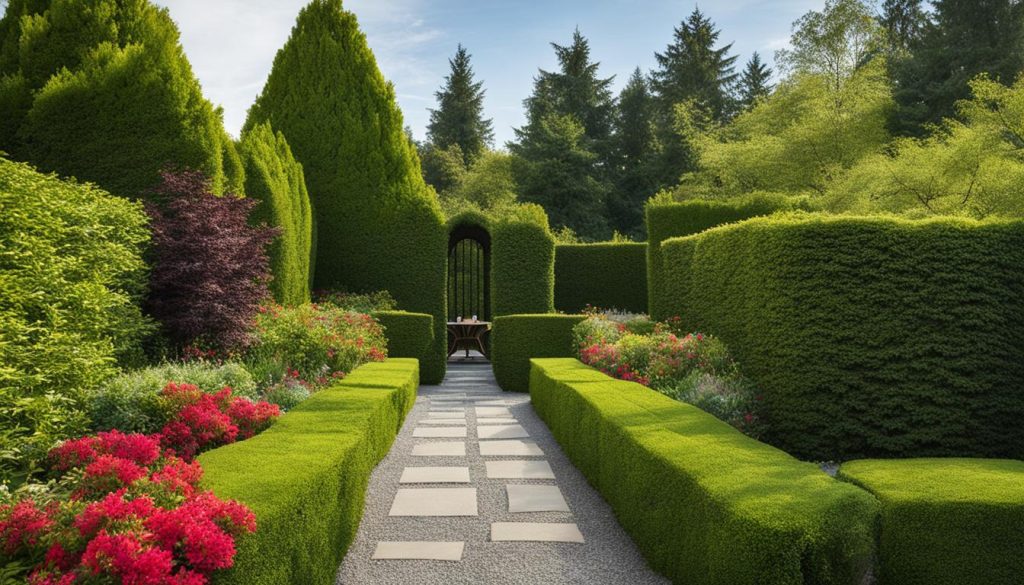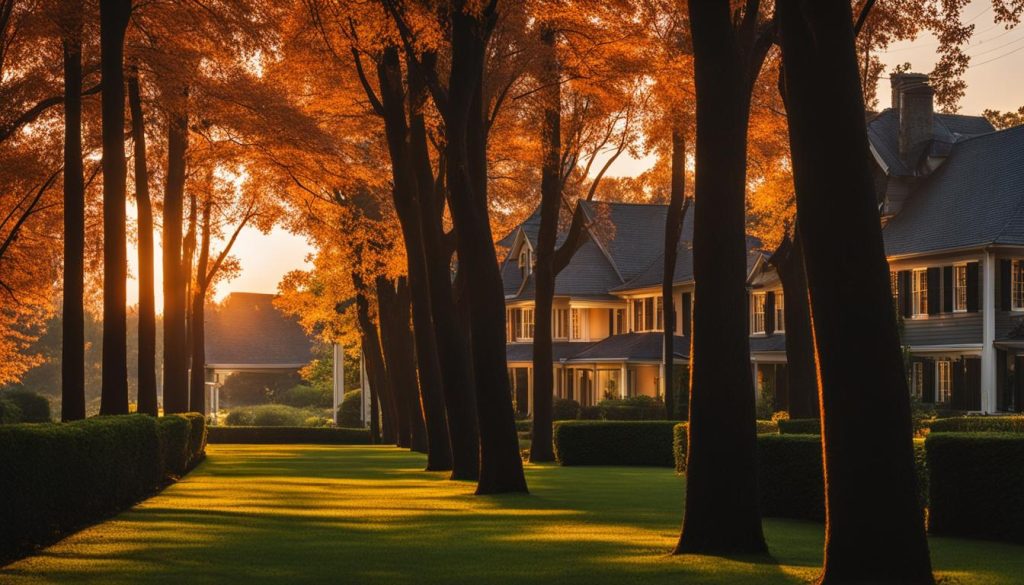Whether you want to create a quiet retreat in your backyard or prevent prying eyes from invading your outdoor space, our expert tips and ideas will help you achieve the level of privacy you desire. In this section, we will explore various planting and structure solutions that can enhance your privacy, so let’s get started!
Key Takeaways
- Selecting the right plants and arranging them thoughtfully can create natural barriers that shield your space from view.
- Structure solutions, such as privacy screens and fences, offer physical barriers to increase privacy.
- Transforming your outdoor space into a private oasis requires creativity and practicality.
- Privacy landscaping should always be aesthetically pleasing while achieving privacy goals.
- There are numerous privacy plants and structure solutions that are suitable for Canadian climates, so you have plenty of options to choose from.
Strategic Planting for Privacy
Creating natural barriers with plants is one of the most effective ways to enhance privacy in your outdoor space. By selecting the right privacy plants and strategically arranging them, you can transform your landscape into a private oasis.
One of the best plants for natural privacy is the arborvitae. This evergreen tree grows quickly, and its dense foliage can create a natural privacy screen. Other good options for privacy plants include the boxwood, holly, and laurel.
When planting for privacy, it’s essential to consider the plant’s height, width, and growth habits. Taller plants should be planted towards the back of your property, while shorter plants can be used in front. Place the plants close together to create a more significant barrier, but make sure they have enough space to grow without overlapping.
In addition to providing privacy, plants can also add beauty and texture to your landscape. Consider incorporating different textures and colors to create an aesthetically pleasing design that matches your style.
More Tips for Planting for Privacy
- Plant shrubs in groups of at least three to create a more substantial visual impact.
- Combine different types of plants to create a layered effect, with taller plants in the back and shorter ones in the front.
- Choose plants that are suitable for your climate and soil conditions to ensure they thrive in your landscape.

Creating privacy with plants is a natural and beautiful solution that can enhance your outdoor space. By selecting the right privacy plants and arranging them thoughtfully, you can transform your landscape into a private retreat that reflects your personal style.
Structure Solutions for Privacy
If planting alone isn’t enough to provide the level of privacy you desire, there are a variety of structure solutions available to create a physical barrier that separates your outdoor space from the outside world. By considering factors such as height, material, and design, you can increase privacy while also adding style and functionality to your landscape.
Privacy Screens
Privacy screens are an excellent option for creating a secluded area within your outdoor space. They come in a variety of materials, such as wood, metal, and vinyl, and can be tailored to fit your specific needs. For example, if you have a small balcony, a retractable privacy screen can provide the desired level of seclusion without taking up too much space.
One of the advantages of privacy screens is that they can be moved around to different areas of your outdoor space. This means you can create privacy exactly where you need it, whether it’s by the pool, on the deck, or in a cozy corner of your garden.
Privacy Fences
Privacy fences are another popular option for creating a physical barrier in your outdoor space. Like privacy screens, they come in a variety of materials and styles, so you can choose the one that best suits your needs and aesthetic preferences.
When selecting a privacy fence, consider the height and placement. A fence that is too short or placed in the wrong spot won’t provide the desired level of privacy. It’s also important to ensure the fence meets local bylaw regulations, particularly if it’s going to be a certain height or made of a specific material.
Landscaping for Privacy with Hedges
In addition to privacy screens and fences, hedges can also be used to create a natural barrier around your outdoor space. Hedges are ideal for those who want to achieve privacy while also maintaining a natural aesthetic.
When selecting the type of hedge to plant, consider factors such as the climate, soil conditions, and maintenance. Some popular options for privacy hedges include cedar, boxwood, and yew.
- Cedar: A popular option for privacy hedges, cedar is a hardy evergreen that can tolerate a variety of soil conditions. It’s also resistant to pests and disease, making it a low-maintenance option.
- Boxwood: With its dense, leafy foliage, boxwood is an excellent option for creating a formal hedge. It’s also easy to shape and maintain, making it a top choice for those who want a well-manicured look.
- Yew: Yew is a slow-growing hedge that can live for hundreds of years. It’s dense foliage and low maintenance make it an ideal option for creating a natural privacy screen.
No matter which structure solution you choose, be sure to consider both your privacy needs and the aesthetic of your outdoor space. With careful planning and thoughtful design, you can create a private oasis that reflects your personal style and enhances the functionality of your landscape.
Transforming Your Outdoor Space into a Private Paradise
Creating a private paradise in your outdoor space is easier than you think. With the right design and decor, you can turn your backyard into a serene retreat that offers both privacy and aesthetic appeal.
Designing for Backyard Privacy
When it comes to designing for backyard privacy, there are several key considerations. First, think about the overall layout of your space. Consider creating distinct zones for entertaining, lounging, dining, and gardening. This will help you define different areas of your backyard and make it easier to create privacy in specific areas.
Next, think about the materials you will use. Incorporating natural materials like stone, wood, and plants can help create a more organic, private feel. Installing a water feature like a pond or fountain can also help create a calming, private atmosphere.
Decorating for Privacy
Decorating your backyard is an essential part of creating a private paradise. Adding outdoor furniture like a cozy seating area or a dining table can make your backyard more comfortable and inviting while offering privacy at the same time. Choose furniture that is both functional and aesthetically pleasing.
Another way to decorate for privacy is to add outdoor lighting. Installing a string of fairy lights or lanterns can create a warm, inviting ambiance while offering a level of privacy after dark.
Planting for Privacy
Planting strategically is an effective way to create natural privacy in your backyard. Choose the right plants for the level of privacy you desire. For full privacy, consider using tall, dense hedges or trees. For partial privacy, mix in lower-growing shrubs and ornamental grasses.
Incorporating plants with different shades of green, textures, and fragrances can also add interest and create a more dynamic environment. Some excellent privacy plants to consider include cedar, arborvitae, and boxwood, all of which are suitable for the Canadian climate.
With these privacy landscaping ideas, you can transform your outdoor space into a private paradise that you can enjoy all year round. Whether you want to escape to a peaceful oasis or create an intimate space for entertaining, we have the perfect privacy ideas to suit your needs.
At Landscaping Markham, we ensure quality work and outstanding customer service with every project, delivering excellence consistently.
FAQ
What are some privacy plants suitable for Canadian climates?
Some privacy plants that thrive in Canadian climates include cedar trees, arborvitae, boxwood, and holly. These plants offer dense foliage and can create a natural barrier to enhance privacy in your outdoor space.
How can I arrange plants strategically to create privacy?
To create privacy through strategic planting, consider placing taller plants along the perimeter of your space to block views from neighboring properties. You can also layer plants of different heights to create a multi-dimensional barrier. Additionally, placing plants closer together can increase their effectiveness in providing privacy.
What are some structure solutions for privacy?
Structure solutions for privacy include privacy screens, fences, pergolas, and trellises. Privacy screens can be made from various materials such as wood, metal, or bamboo and can be customized to fit your style and needs. Fences provide a physical barrier and come in different designs and heights. Pergolas and trellises can be adorned with climbing plants to create a natural privacy wall.
How can I transform my outdoor space into a private paradise?
To transform your outdoor space into a private paradise, you can incorporate elements such as tall plants, privacy screens, and fences to create a sense of seclusion. Consider adding outdoor curtains, pergolas with drapes, or decorative panels to add privacy and style. You can also use landscaping techniques like creating intimate seating areas or utilizing vertical gardening to enhance privacy and create a cozy atmosphere.

